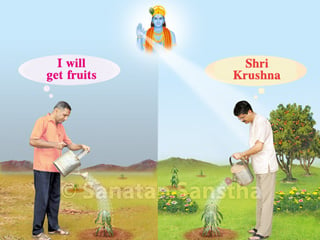In this article all the different types of karma are discussed in detail.
1.Voluntary and involuntary karma
Voluntary karmas (these karmas generate merits and demerits, and impressions on the subconscious mind).
A. Happiness-sorrow associated with the motor organs
All the voluntary karmas performed by our body and the motor organs are with the purpose of attaining happiness and eliminating sorrow.
B. Happiness-sorrow associated with the mind
To think is the karma of the mind. When our thoughts match with those of others, meaning when they are favourable, we become happy. Conversely, when they are against the thoughts of others, meaning unfavourable, we become unhappy.
C. Happiness-sorrow associated with the intellect
Taking decisions is the karma of the intellect. If our decisions are consistent with the decision of others, we derive happiness and if they are contrary, we become unhappy. Karma that generates either happiness or sorrow entraps us in bondage.
D. Involuntary karma (where no merits, demerits or impressions are generated)
Karmas such as breathing, beating of the heart, blinking of eyelids are involuntary. Karmas such as eating to satisfy hunger, drinking water to quench thirst, urination, sleeping etc. are essential to sustain life. Such karmas do not generate any merits-demerits or impressions, neither do they generate attachment, affection, nor is there an expectation of the outcome. These karmas take place naturally and hence, there is no sense of doership while performing them either; therefore, they do not entrap us in bondage.
2. Beneficial and harmful karma
-
Karma beneficial and harmful to the self
-
Karma beneficial and harmful to others
3. Vihit and nishiddha-karma
A. Vihit (Prescribed) karma
Duties which are mandatory fall in this category. By evading these duties we incur demerits; however, by performing them merits are not incurred. For example, service unto one’s parents.
B. Nishiddha (Prohibited) karma
Karmas such as drinking liquor, stealing, etc. that are prohibited by the scriptures fall in this category. If prohibited karma is performed, we incur demerit; but we do not acquire merit if it is not performed.
4. Types of karma according to organs
A. Kayik-karma
-
Related to sense organs: To smell, to taste, to see, to touch and to hear.
-
Related to motor organs: To walk, to cut vegetables, to talk, to pass stools and urine, etc.
B. Mental karmas
Thoughts, emotions, desires, etc.
-
Intellectual karmas: To understand, to take decisions, etc.
-
Karma related to the subconscious mind: To remember, etc. The emotion of ‘me’ and ‘mine’ is associated with each of the above actions.
C. The meaning of the word enjoyment in relation to the karma of various bodies
-
Physical body (gross body): Struggling to acquire what is unavailable, for example food, clothing.
-
Mind (subtle body): Whatever knowledge is acquired, assimilating it and putting it into practice.
-
Intellect (causal body): Establishing correlation with one’s own and others’ thoughts.
5. Karma related to others
A Sanghik-karma
Karma performed unitedly for the prosperity of an organisation. These Karmas are to be performed in the capacity as members of a family, society, village, country and the world.
B. Kartavya-karma
-
Performing karma as kartavya (Duty) : The karma in day-to-day life has to be performed with a sense of duty, unperturbed by the Maya that is its part. Destiny takes its own course; but without getting perturbed by Maya, an individual should continue performing karmas that he comes across in a business-like fashion and with a sense of duty.
-
Performing kartavya-karma does not help acquire merit; but not performing them leads to acquiring of demerit.
-
Whoever performs kartavya-karma is graced automatically with everything : God develops respect towards those who demand nothing and perform karma with a sense of duty. Such people are rewarded automatically with everything.
C. Everyone’s ideal karma
-
An honest servitor : Performing any task assigned by the master with dedication.
-
A son : Considering devotee Pundalik as a role model in obeying his parents’ orders and serving and nursing them.
-
A chaste and dutiful wife : In order to keep the husband happy, performing the household daily chores, serving in-laws, welcoming the visitors, etc. in the best possible manner.
-
A king : Ensuring the welfare of his subjects, rearing and feeding of subjects in the best possible manner and defending them from enemies.
-
A devotee : To render physical service with the emotion that, every task is the worship of God.
-
The knowledgeable : After the realization of Atmaswarup (Nature of the soul), maintaining a steadiness in attitude. Seeing all the living beings as derivatives of the same Supreme soul and loving one and all.
-
Karmayogi (Practitioner of Karmayoga) : Not to have any attachment, pride or expectation towards fruit of karma. Performing karma with dedication followed by Brahmarpan (Offering it to Deity Brahma).
-
Saints : Drawing society towards spiritual practice.
6. Karma complementary to spiritual practice
A. Types of karma according to the class system
There are four classes – Brahman (Priest), Kshatriya (Warrior), Vaishya (Businessman) and Shudra (Labourer). The karmas to be performed by each class are well-defined, for example the six most important karmas for Brahmins are –
-
Bath
-
Sandhya and chanting
-
Hom (Sacrificial fire)
-
Recitation
-
Ritualistic worship
-
Offering daily oblations & welcoming guests
B. Continuing to perform karmas as per the duties defined by the class system is niti dharma
Continuing to perform karma at one’s own level as per the system of classes, while still abiding by the organizational structure and the rules of the society, is nitidharma (Code of ethics). Nitidharma depends on an individual’s social status and duties defined by the class system. Cross breeding of the classes with different attitudes leads the individual and the society to hell. This is the grand cannon of sociology.
C. Karma as per Era (Nitya-karma etc.)
Nitya-karma – Definition: Karma performed punctually every day is called nitya-karma, for example bath, ritualistic worship, sandhya etc. Nitya-karma is obligatory. If it is not performed, the individual gets punishment or sorrow from the society or nature in some form or the other. If nityakarma is not performed, accruing of demerits is certain.
Importance: Some nitya-karmas have been prescribed by the scriptures, for example paying obeisance to the Deities, ritualistic worship, Yadnya and chanting. Performing them does not ensure comprehensive benefits, but not performing them is certainly damaging.
-
When nitya-karmas such as bath, worship, meditation etc. are performed the day passes on a good note. The mind remains under control and can be kept fresh the whole day.
-
Nitya-karmas impart the ability to gain control over personality defects such as desire, anger etc.
-
A disciplined way of life ensures there is no downfall in the life of an individual. An individual performing nitya-karmas never slips; on the contrary, he certainly attains the capability to rise higher.
D. Naimittik-karma
Karma that is performed with a specific purpose is termed as naimittik-karma. For example, bhumipujan (Worship of a site), vastushanti (Worship for purification of a premises), shraddha. Of the naimittik-karmas, not performing the likes of thread ceremony, marriage etc. deprives an individual of dwijatva (Character of Brahman), fatherhood, etc. Not performing the naimittik-karmas amounts to sinning. Some karmas such as bhumipujan help avoid distresses that have a Divine cause.
7. Shrout, smart and pouranic karmas
A. Shrout-karmas
Karmas advocated by the Shruti (Vedas), for example Yadnya-yag (Sacrificial fires).
B. Smart-karmas
Karmas advocated by the Smruti, for example the karma to be performed as per the class system.
C. Pouranic-karmas
Karmas advocated by the Purans, for example performing vrats and fasting.
8. Vidhayak-karya (or karma)
A. Vidhayak-karya is an activity carried out by the intellect enlightened by the study of Vedas. We should be devoted to the cause of vidhayak-karya (as expected by Dharma), and through this medium should develop an attitude suitable for seeking God. Hence, every karma that we perform should be with the intellect that has been enlightened with the study of Vedas.
This is called the vidhayak attitude in devoting wholeheartedly to the cause of an activity. In short, any karma that we perform should be such that self-evolution (that is, development of the mind) will not be hampered. This gives the karma the position of a Yadnya.
B. Vidhayak-karya and faith in God
-
If an individual is dull, yet has true faith in God, then by God’s grace he will meet someone who engages him in a vidhayak-karya.
-
If someone does not have true faith, but is on the righteous path all the same, then his deeds will result in merits without him getting spiritually evolved. Subsequently, when he takes a human rebirth, because of the merits, he will be bestowed with materialistic pleasures; however, due to lack of a pure intellect the likelihood of his downfall will remain high.
9. Types according to Dnyanyoga (Path of Knowledge)
A. Shreyas-karma
Shreyas means superior. Karma that brings about spiritual evolution that is Moksha is shreyas-karma.
B. Preyas-karma
Preyas means loveable. Pleasures that are obtained through the medium of the sense organs are instant; hence, the ordinary man loves preyas-karma. Such happiness is temporary and very often gives sorrow at a later stage.
ये हि संस्पर्शजा भोगा दुःखयोनय एव ते । – Shrimadbhagwadgeeta
Meaning : The pleasure born out of sense objects is invariably a source of sufferings.
10. According to analysts, there are four
types of karmas – karma, vikarma, akarma and nishkarma
A. Karma
Performing the right activity or the activity as advised by the scriptures (Activities of Shri Shankaracharya, Yogi Aurobindo, Swami Chinmayanand, Maharshi Mahesh Yogi, Dr. Radhakrishnan, Swami Shivanand, Dr. Annie Besant etc.)
B. Vikarma
-
Kruti and kriya prohibited by the scriptures
-
Performing karmas which are tainted and whose outcome is bad
-
Karma performed with attachment & expectation of outcome
-
A specifi c karma, meaning a kruti and kriya, associated with the class system or the ashrams (Stages in life), performed with special expectation of uplifting the society. (Activities of Saint Dnyaneshwar and Swami Swarupanand)·
-
Karma performed wholeheartedly for the welfare of others
C. Akarma
-
Not performing any kriya or karma
-
Karmas prohibited by the scriptures
-
Karma offered unto Brahman (For example – Activities of Swami Swarupanand)
-
Karma that does not have any outcome (For example – Activities of Swacchandanand Swami)
-
Karma performed without expectation of the outcome (For example – Activities of Pandit Satawalekar)
-
Not enjoying the fruits of karma, nishkarma or not performing any karma at all
-
Renouncing the doership of karma
D. Nishkarma
Not performing any karma at all. Not getting bound by the restrictions of karma or the mind not getting engrossed in karma while performing it, is called nishkarma. People who are liberated from the bondage of sanchit-karma
(Karma resulting from accumulated ‘give-and-take’ account) and kriyamaṇ-karma (Karma resulting from wilful actions) get bestowed with nishkarma related supernatural powers.
11. Sattvik, rajasik and tamasik karma
The goal, the means, and its effect on others decides whether the karma is sattvik, rajasik or tamasik.
A. Sattvik-karma
नियतं सङ्गरहितमरागद्वेषतः कृतम् ।
अफलेप्सुना कर्म यत्तत्सात्त्विकमुच्यते ॥
– Shrimadbhagwadgeeta, Adhyaya 18, Shloka 23
Meaning : Karma which is ordained by the scriptures (vihit-karma) and is not accompanied by a sense of doership, and has been performed without any attachment or aversion by one who seeks no return, is called sattvik-karma. Among the sattvik, rajasik and tamasik karmas, the sattvik-karma performed without expectations is said to be the best karma.
-
Helping others selflessly
-
Experiencing happiness in others’ happiness
B. Rajasik-karma
यत्तु कामेप्सुना कर्म साहंकारेण वा पुनः ।
क्रियते बहुलायासं तद्राजसमुदाहृतम् ॥
– Shrimadbhagwadgeeta, Adhyaya 18, Shloka 24
Meaning : That karma, however, which involves much strain and is performed by one who seeks enjoyments or by an egoistic man, has been spoken of as rajas-karma.
- Activity performed for fulfilling one’s own selfish needs, for example karma performed to gain money, name and fame.
C. Tamasik-karma
अनुबन्धं क्षयं हिंसामनपेक्ष्य च पौरुषम् ।
मोहादारभ्यते कर्म यत्तत्तामसमुच्यते ॥
– Shrimadbhagwadgeeta, Adhyaya 18, Shloka 25
Meaning : Karma which is undertaken through sheer ignorance, without regard to consequences or loss to oneself, injury to others and one’s own resourcefulness, is declared as tamas-karma.
-
All activities that inflict pain on others
-
Activity performed without prior preparation and detailed planning
Reference : Sanatan Sanstha’s Holy text, ‘Importance, Characteristics and Types of Karma‘

 What is Kriya and what are Kruti and Karya
What is Kriya and what are Kruti and Karya True and Fake Karmayogi
True and Fake Karmayogi Essence of karma to be performed according to Karma-yoga and How does Karma work ?
Essence of karma to be performed according to Karma-yoga and How does Karma work ? Special characteristics of Karma-yoga and Karma fruit
Special characteristics of Karma-yoga and Karma fruit Importance of Karma according to Karma-yoga
Importance of Karma according to Karma-yoga